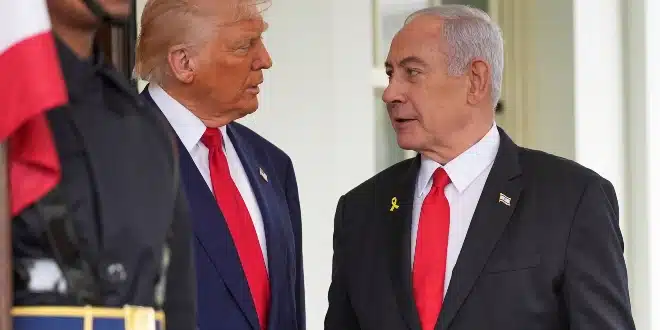A growing rift between Israeli Prime Minister Benjamin Netanyahu and senior Trump administration officials has emerged following unexpected Israeli airstrikes in Syria. According to multiple sources, the Israeli leader’s recent actions have sparked internal frustration in Washington, with some top U.S. officials privately characterizing Netanyahu as reckless and disruptive to diplomatic efforts.
White House Caught Off Guard by Syrian Bombings
Tensions escalated after Israel launched a surprise strike on Syrian military tanks heading toward Suwayda, despite a U.S.-brokered ceasefire in the region. The convoy was reportedly involved in escalating violence between local Druze militias and Bedouin tribal groups, which has already resulted in more than 700 deaths. Israeli authorities defended the move, claiming the tanks entered a demilitarized zone and posed a threat to the Druze minority. Syrian officials denied any such targeting.
Although U.S. envoy Tom Barrack had previously secured an agreement from Israeli officials to hold off on military action in favor of diplomatic negotiation, that understanding quickly unraveled. Just 24 hours later, Israeli forces intensified their campaign, striking Syria’s military command center and areas surrounding the presidential palace in Damascus.
One senior U.S. official told Axios the strikes came as a complete shock to President Donald Trump and his advisers. “The president doesn’t like turning on the television and seeing bombs dropped in a country he is trying to bring peace to,” the source noted.
Netanyahu’s Impulsiveness Draws Sharp Criticism
The surprise nature of the strikes, and their potential to derail U.S.-led peace efforts in the region, has triggered unusually candid criticism from within the Trump administration. One official bluntly told Axios: “Bibi acted like a madman. He bombs everything all the time. This could undermine what Trump is trying to do.” Another expressed personal exasperation with Netanyahu’s approach: “It’s like every day there’s something new. What the f***?”
Concerns within the White House have apparently been building, especially following the controversial shelling of a church in Gaza. According to Axios, that incident prompted President Trump to personally call Netanyahu to express dissatisfaction.
The mounting frustrations reflect a deeper anxiety in Washington about Netanyahu’s strategic unpredictability. A third U.S. official compared the Israeli leader’s behavior to that of an unruly child: “Netanyahu is sometimes like a child who just won’t behave.”
U.S.-Israel Diplomatic Strains Widen
While the U.S. and Israel have long maintained a close strategic alliance, particularly during the Trump presidency, the recent series of military actions by Israel without prior consultation marks a serious test of that relationship. The strikes in Syria have not only jeopardized fragile ceasefire arrangements but also risk undermining American credibility in mediating peace in the region.
The administration now faces a dilemma: how to maintain strong ties with Israel while keeping Netanyahu’s unilateral military decisions in check. As peace talks continue and regional tensions remain high, further unsanctioned actions from Israel could lead to deeper diplomatic fissures—especially if they jeopardize high-level negotiations the U.S. is seeking to guide.
This episode underlines the complex balancing act in U.S. foreign policy in the Middle East—supporting key allies like Israel while trying to stabilize volatile conflict zones. With emotions running high in both Jerusalem and Washington, the long-term implications of Netanyahu’s recent strikes remain to be seen.


